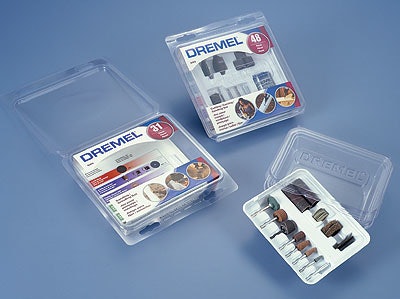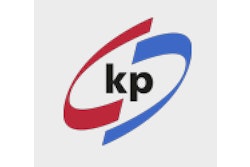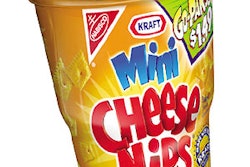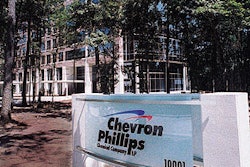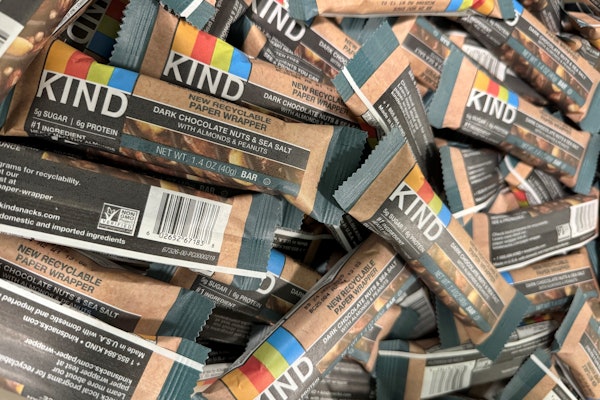About 18 months ago, Dremel began to market a new packaging system for the 150 accessories it makes for its line of rotary cutting tools. The unique double-clamshell package met a rigid set of marketing requirements, and special polyvinyl chloride sheet was chosen by its thermoformer, Alloyd Corp. (Dekalb, IL), to handle the difficult forming.
In the past, the Racine, WI-based maker of cutting and routing tools packaged the accessories in an array of bags and blister packs that were called “dysfunctional” for marketing and display. So says Debbie Groshek, marketing manager for Dremel accessories. Beginning in late summer 2000, the company began to “assert our market leadership by creating multi-dimensional packaging that would appear more high-end and address the need for ease-of-use,” she says.
The solution wasn’t a single package, but rather eight different custom tray designs using a variety of forming techniques to accommodate up to two dozen small accessories, all organized with a new color-coding system.
For several reasons, Dremel chose to work with Alloyd. Not only is the company headquartered near Dremel’s headquarters, but its experience in design, sampling, and production were important to Dremel. Alloyd’s multiple plant locations helped, too. Its southern California plant is not far from Dremel’s Mexicali, Mexico, assembly and packaging plant. Also appealing, according to Groshek, is Alloyd’s national sales and service.
When the package design team from Dremel and Alloyd met, the task was to create a uniform package with the versatility to fit neatly into a planogram at large retailers such as Lowe’s and Home Depot, but also in hardware and hobby stores. The ultimate challenge was to create a family look that would enhance Dremel’s presence in display.
In the end, Groshek and her colleagues created a three-component package: a disposable outer clamshell with tamper evidence; an inner clamshell that recloses and stacks; and a custom insert tray that holds the parts.
Alloyd’s primary role was to develop a package platform that would allow each of the eight accessory assortment trays to fit inside the same set of inner and outer clamshells. Along with versatility, the common platform trays would increase plant productivity for Dremel because only one set of tooling would be required for sealing.
Plus, as the inner clamshell would be reusable, Alloyd embossed the Dremel name into the tray.
Tough to design
“The hardest part was to develop designs that would hold all the parts in place in the insert tray,” Groshek says. “Some needed to actually snap into cavities.” Alloyd’s Midwestern regional sales director, Robert van Gilse, says that extensive engineering was employed, eventually incorporating raised detents in the trays. He adds that within the 4.3x5.3” tray, tolerances were unusually tight. So Alloyd turned to its sole supplier of material, Klöckner Pentaplast of America (Gordonsville, VA).
The tight tolerances, along with a negative draft angle for snap closing, had the potential for generating a lot of scrap. Klöckner recommended its white Pentaform® TH 758/80 vinyl in a 14-mil thickness because its wider forming temperature range would allow it to flow more easily into the tooling cavities. Van Gilse says that the material’s high-grade thermal properties result in fewer rejects. “Tighter control in sheet manufacturing enables us to better control the stretch of the material in forming,” he says. “This also helps in reducing scrap.”
The inner clamshell measures about 5.9x5.4” and is made from Pentaform TH 557/00 clear vinyl in a 20-mil thickness. Van Gilse says it requires precise undercuts where the insert tray fits into it. And it’s embossed with the Dremel name so the user maintains top-of-mind recognition when stacking or reusing the tray.
RF sealing
Finally, the outer clamshell had to be designed to hold the inner clamshell as well as a paperboard wraparound card that’s printed with the manufacturer’s merchandising graphics. To achieve the customer’s need for tamper evidence, Alloyd suggested the tray be weld-sealed with radio frequency (RF). The RF-sealed tray requires the user to open with scissors or knife, so it protects against pilferage of its high-value contents.
Since RF sealing uses a full-perimeter seal bar, the clamshell needs to be made of sheet that’s virtually free of contaminants; otherwise, seal tooling could be damaged. So Alloyd uses the same Pentaform sheet as for the inner clamshell, but in a 15-mil thickness. According to van Gilse, the sheet exhibits a lower heat history with fewer carbon particles, and that translates into fewer contaminants. In fact, the sheet is so clean that Alloyd embosses into the flange area the instruction, “Cut along line to open” that’s readable in type just 1/8” high.
All trays and clamshells are formed at Alloyd’s Fontana, CA, plant, using a Model 2400 thermoformer that Alloyd makes. Trays are formed four-up, cut from the sheet, and automatically stacked. Later, the parts are loaded into containers and shipped to Dremel’s Mexicali plant where they’re loaded by hand and sealed in a new RF sealer that the company declined to identify.
Although Dremel’s Groshek admits the new packages cost more than the ones they replace, she says the company has been very satisfied with the results. “We’ve experienced significant sales increases because of the new packaging,” she says. “The added sales have more than offset the cost increases.”
